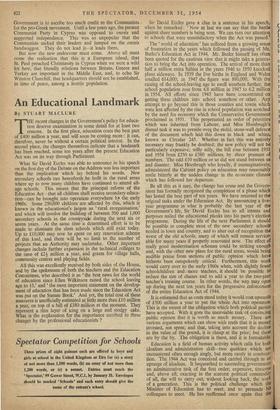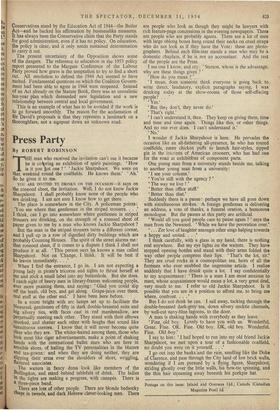An Educational Landmark
By STUART MACLURE THE recent changes in the Government's policy for educa- tion deserve examination in some detail for at least two reasons. In the first place, education costs the best part of £400 million a year, and will soon be costing more : it can, therefore, never be without a certain political interest. In the second place, the changes themselves indicate that a landmark has been reached, some ten years after the present Education Act was on its way through Parliament.
What Sir David Eccles was able to announce in his speech on the first day of the Debate on the Address was less important than the implication which lay behind his words. New secondary schools can henceforth be built in the rural areas where up to now many children have continued to attend all- age schools. This means that the principal reform of the Education Act- –that all children shall receive secondary educa- tion--can be brought into operation everywhere by the early • 1960s. Some 250,000 children are affected by this, which is known in the educationist's jargon as 'rural reorganisation,' and which will involve the building of between 500 and 1,000 secondary schools in the countfyside during the next six or seven years. At the same time a determined effort is to be made to eliminate the slum schools which still exist today. Up to £10,000 may now be spent on any renovation scheme of this kind, and there will be no limit to the number of projects that an Authority may undertake. Other important changes include further expansion in the technical colleges to the tune of £2i million a year, and grants for village halls. community centres and playing fields.
All this was excellently received by both sides of the House, and by the spokesmen of both the teachers and the Education Committees, who described it as 'the best news for the world of education since Ellen Wilkinson raised the school leaving age to 15,' and 'the most important statement on the develop- ment of education that has been made since the Education Act was put on the Statute Book.' And yet, the total cost of these measures is unofficially estimated at little more than £10 million a year, on top of a bill of £380 million at the moment. They represent a thin layer of icing ofi a large and stodgy cake. What is the explanation for the importance ascribed to these changes by the professional educationists ? Sir David Eccles gave a clue in a sentence in his speech, when he remarked : Now at last we can say that the battle against sheer numbers is being won. We can turn our attention to schools that were unsatisfactory when the Act was passed.'
The 'world of education' has suffered from a growing sense of frustration in the years which followed the passing of Mr. Butler's Education Act in 1944. Mr. Butler himself has often been quoted for the cautious view that it might take a genera- tion to bring the Act into operation. The arrival of more than half a million extra babies in the years 1946 to 1950 knocked plans sideways. In 1939 the live births in England and Wales totalled 614,000; in 1947 the figure was 880,000. With tl o raising of the school-leaving age to swell numbers further, the school population rose from 4.8 million in 1947 to 6.2 million in 1954. All efforts since 1945 have been concentrated on getting these children into school somehow or other. Any attempt to go beyond this in those counties and towns which were less affected by the rise in school population was scotched by the need for economy which the Conservative Government proclaimed in 1951. This perpetuated an order of priorities which was inherited from Labour, and Miss Horsbrugh's dismal task it was to preside ove; the stolid, stone-wall defent of the document which laid this down in black and white, known as Circular 245. Whether in fact this was entirely necessary may frankly be doubted; the new policy will not be particularly expensive; willy filly, the bill rose between 1951 and 1954 from £250 to £380 millions, by sheer pressure of numbers. The odd £10 million or so did not stand between us and disaster. Miss Horsbrugh who loyally, if unimaginatively, administered the Cabinet policy on education may reasonably smile bitterly at the sudden change in the economic climate which has followed her departure.
Be all this as it may, the change has come and the Govern- ment has formally recognised the completion of a phase which has lasted the best part of ten years. We have returned to the e original tasks under the Education Act. By announcing a five- year programme in what is probably the last year of the e Government's life, Sir David Eccles has to all intents and purposes nailed the educational planks into his party's election programme. During the life of the next Parliament it should be possible to complete most of the new secondary schools needed in town and country, and to alter out of recognition the e worst of the old schools, many of which will remain service- able for many years if properly renovated now. The effect, of really good modernisation schemes could be striking mooch and, with the other new plans for the rural areas, would bring audible praise from sections of public opinion which have hitherto been outspokenly critical. Furthermore, this work would carry over to the early 1960s when, with slightly fewer schoolchildren and. more teachers, it should be possible to reduce the size of classes and to add a year to the two-yeaf teacher's training course. In other words, the way may opt 0 up during the next ten years for the progressive enforcement of the entire Education Act of 1944.
It is estimated that as costs stand today it would cost upwards of £500 million a year to put the whole Act into operation. This is the extent of the obligation which both political parties have accepted. With it goes the Unenviable task of convincing public opinion that it is worth so much money. There are various arguments which can show with truth that it is money invested, not spent; and that, taking into account the decline in the value,of the pound, it is cheap at the price; but these are by the by. The obligation is there, and it is formidable. conservatives stand by the Education Act of 1944—the Butler Act—and he backed his affirmation by businesslike measures. It has always been the Conservative claim that the Party stands or good administration, even if it has no policy. On education, the policy is clear, and it only needs sustained determination to carry it out.
The present uncertainty of the Opposition shows some of the dangers. The reference to education in the 1953 policy report presented to the Margate Conference of the Labour Party proved how grave is the temptation to try to find a short cut. All resolution to defend the 1944 Act seemed to have melted. Fundamental questions on which the Coalition Govern- ment had been able to agree in 1944 were reopened. Instead of an Act already on the Statute Book, there was an unrealistic ten-year plan which demanded new legislation and a new relationship between central and local government.
This is an example of what has to be avoided if the work is to go forward smoothly. The reason for the acclamation of Sir David's proposals is that they represent a landmark on a thoroughfare, not a signpost down an unknown road.



























 Previous page
Previous page